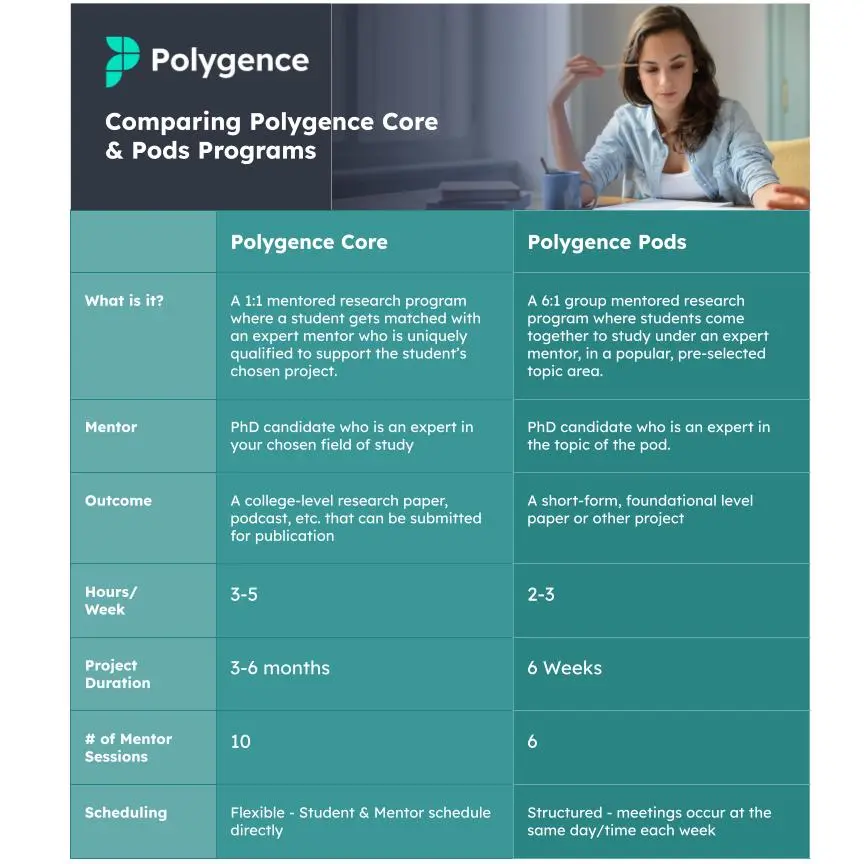Career Exploration for High School Students: Discover Their Future with Polygence
6 minute read
“What do you want to be when you grow up?”
It’s the classic question at every family gathering, for high school students, it’s more than just small talk—it’s a crucial decision that shapes their future. What they choose to study and the interests they pursue can influence their career trajectory and personal fulfillment.
While some students identify a career path early, many remain unsure. In fact, a survey found that 75% of high school graduates felt moderately, slightly, or not at all prepared to make college or career decisions after graduation, highlighting the uncertainty they face. This is where career exploration areer exploration programs like Polygence become invaluable, offering personalized mentorship that allows teens to test out potential careers before committing to one.
A proven college admissions edge
Polygence alumni had a 89% admission rate to R1 universities in 2024. Polygence provides high schoolers with a personalized, flexible research experience proven to boost their admission odds. Get matched to a mentor now!"
How Can Your Teen Explore Future Careers in High School?
Career exploration in high school provides students with the chance to explore different career paths before making life-altering decisions. By exposing them to new fields and opportunities, they can develop a deeper understanding of their passions and skills. Here are some effective ways teens can start their career journey.
1. Self-Reflection: The First Step to Success
Career success starts with self-awareness. Your teen should identify their strengths, interests, and values as the first step toward building their future. However, with packed schedules and academic pressures, students rarely have time to explore their passions.
Career interest surveys and personality assessments, like our Passion Profile Quiz, can help teens uncover valuable insights about themselves. Once they understand their interests, they can start taking actionable steps toward a career path that excites them.
2. Exploring Career Clusters: Finding the Right Fit
With countless career paths to choose from, narrowing down options can feel overwhelming. Career clusters group similar career choices together, helping teens find a direction that aligns with their passions and skills.
For example, a student interested in technology and space exploration might explore careers in aerospace engineering, while one passionate about storytelling and design could consider animation or multimedia production.
By focusing on career clusters, students can identify connections between different fields, opening up opportunities they may not have considered before. It all starts with that first spark of curiosity. Whether it’s tackling social issues or experimenting with AI, these clusters help teens connect their interests to real-world opportunities.
3. The Role of Trusted Adults: Guiding Your Teen’s Journey
No student navigates career exploration alone. Parents, teachers, and mentors serve as invaluable resources, providing guidance, encouragement, and knowledge as teens explore their career interests.
Parents: Provide insight into their teen’s strengths and passions but may lack industry-specific knowledge to guide the next steps.
Teachers: Help teens discover what they excel at and encourage exploration of different academic and career paths.
Mentors: Offer real-world insights into industries, providing valuable career guidance and exposure to professional networks.
Programs like Polygence go beyond traditional mentorship, offering hands-on projects that help students explore different career paths while building critical thinking and leadership skills.
For example, when Luke started his project, he wasn’t sure if he wanted to pursue psychology or psychiatry. With guidance from his Polygence mentor, Gabor, he not only learned about both fields but also developed a strong interest in psychiatry. This clarity helped him confidently decide on his future path.
Tell us how you feel...
Interested in Psychology? We'll match you with an expert mentor who will help you explore your next project.
Career Research: Building Knowledge and Understanding
Beyond self-reflection, gaining practical knowledge about different careers is essential. Researching job responsibilities, growth prospects, and required education can help students make informed choices.
1. Leveraging Online Resources
Making informed career decisions requires access to the right information. Online tools like O*Net Online, CareerOneStop, and the Bureau of Labor Statistics (BLS) provide valuable insights:
O*Net breaks down education requirements, skills, and daily responsibilities for various careers
CareerOneStop helps teens explore career paths, find training programs, and tips on preparing for the workforce.
The BLS provides current employment trends, salary data, and job outlooks to help teens set realistic expectations to help teens with a clear picture of what to expect.
These resources give students the data they need to make educated choices about their future, helping them align their interests with viable career paths.
2. Gaining Industry Insights: Real-World Knowledge
Textbooks can only go so far in preparing students for the workforce. Real-world experiences like job shadowing, internships, and informational interviews offer a deeper understanding of careers beyond the classroom.
Job Shadowing – Observing a professional at work gives teens firsthand exposure to day-to-day responsibilities.
Informational Interviews – Connecting with professionals through LinkedIn or personal networks can provide unique insights into different career paths.
By engaging in these experiences, teens gain a better grasp of what a career entails, helping them decide if it's the right fit for them.
2. Hands-On Experiences: Deepening Interests
Once your teens decide on the specific career they want to explore, gaining practical experience is crucial. Internships, summer camps, and workshops provide hands-on training and valuable skills:
Internships: These offer the closest experience to having a real job. High schoolers can find internships through their schools’ career counselors or online platforms like LinkedIn, Indeed, or Glassdoor. Nonprofits and government programs may also have opportunities that align with teens' interests.
Summer Camps and Workshops: These programs, like the Summer Campus Immersion and Research Program by Envision and Polygence, offer exposure and experiences beyond the classroom, helping teens deepen their interests and gain practical knowledge.
By participating in these hands-on experiences, teens can better understand their chosen career paths and develop the skills needed for future success.
Why is Gen Z Seeking Improved Career Exploration Opportunities in High School?
As Gen Z enters the workforce, they are redefining career success with new priorities, expectations, and goals. Unlike previous generations, Gen Z is placing greater emphasis on meaningful work, flexibility, and skill development over traditional career paths. This shift highlights the need for robust career exploration opportunities that align with their evolving interests.
1. The Changing Workforce Landscape
Gen Z is known for their innovative mindset and fresh perspective on career decisions. For them, it’s not just about having a job—it’s about finding one that aligns with their passions and a sense of purpose. They focus more on work-life balance, mental health, and quality of life. In other words, Gen Z values opportunities that allow them to thrive both personally and professionally. This perspective has somehow reshaped the landscape and redefined the pursuit of career achievement. Therefore, career exploration and preparation are specifically important for Gen Z to fulfill their professional lives.
2. Preparing for Technological Advancements
With the rapid rise of technology and AI, new industries are opening up. Teens now need to prepare for modern technological industries such as Artificial Intelligence (AI) and green energy. They open more career opportunities, but also bring new challenges, demanding for specialized skills that are not covered in school curricula. To be work-ready in these fields, teens must gain exposure to industry insights and hands-on experiences. This involvement not only helps them explore their interests but also decide if they are ready to pursue careers in these areas. By developing a deep understanding of these fields, teens can quickly adapt and succeed in an increasingly technology-driven market.
3. Personalized Learning and Flexibility
If you feel your teen is missing crucial skills due to traditional one-size-fits-all approaches, you’re not alone. Preparing teens for the future requires personalized learning that aligns with their unique preferences and interests. There’s a growing demand for personalized learning options that offer flexibility to fit teens’ busy schedules. Many parents love to see their kids engage in meaningful projects and develop valuable skills beyond school work. Personalized learning gives teens the opportunity to explore their passions, gain knowledge, and especially feel genuinely excited about something.
The Role of Planning in Career Exploration
Having a clear plan for career exploration helps teens set realistic goals and make informed decisions about their future. By breaking the process into manageable steps, they can navigate their career journey with confidence and direction
1. Setting Short- and Long-Term Goals
Your teen needs both short- and long-term goals to stay on track in their career journey. Both serve as a roadmap to help teens navigate, prioritize, and stay focused. They should also consider how their classes and extracurricular activities align with their passions and future ambitions. For instance, a teen interested in Computer Science could learn programming languages, participate in coding competitions, or start building a portfolio on GitHub to showcase their projects. Short-term goals, like finishing a coding project or picking up a new programming skill, can boost confidence, while long-term goals, like studying computer science as a major in college or landing an internship, give them direction for the future.
2. Exploring Financial Feasibility
When planning a career, teens should consider both the potential earnings and the cost of education to balance career goals with financial feasibility. For instance, while careers in Medicine may offer high salaries, they often come with significant educational costs. In contrast, tech jobs typically require less time and financial investment to enter. Teens can also explore scholarships, financial aid, and more affordable study options. This approach will help them select a career path that is both financially sustainable and aligned with their future goals.
How Polygence Pods and Research Mentorship Programs Drive Success
Polygence offers personalized projects and one-on-one mentorship to empower students to explore their passions, gain valuable skills, and build confidence in their abilities. With Polygence, teens gain the autonomy to take charge of their passion projects. Unlike regular homework, these projects are not just tasks to check off a list — they’re opportunities to understand, learn, and create something meaningful.
Polygence provides a wide range of fields that cater to every teen's interests—from STEM to the arts—allowing them to pursue their interests. We offer two main program options designed to meet your teen’s unique needs:
Polygence Pods: Pods are a six-week exploratory program in which students work with a mentor and like-minded peers to gain career exposure.
Core Program: Our Core Program is a personalized mentorship program in which students develop hands-on projects in their chosen field, resulting in tangible outcomes like research papers and portfolio pieces.
Both programs provide an excellent foundation for success, equipping students with the tools and experience to pursue their dreams with confidence.

Polygence alum Youssef, now a mechanical engineering student at Northwestern University, leveraged our program to create award-winning projects like the TitanWandelaar (a mechanical walker for Mars rovers) and AutoMelter (an anti-snow system for driveways). With Polygence’s mentorship, he transformed his passion into published achievements.
Polygence also helped Chloe, a high school student, explore environmental science. With guidance from her mentor, she conducted a research project on carbon sequestration, which solidified her passion for environmental science and gave her confidence in her college applications.
Polygence Scholars Are Also Passionate About
Your Teen’s Future Starts with Career Exploration
Starting career exploration early gives teens the clarity and confidence they need to make informed decisions. With the right support system, students can avoid career detours and build a future that aligns with their passions and strengths.
Polygence provides the mentorship, direction, and tools students need to take control of their career exploration journey. If you're ready to help your teen gain real-world experience and future-ready skills, sign up with Polygence today and set them on a path toward a fulfilling future.
